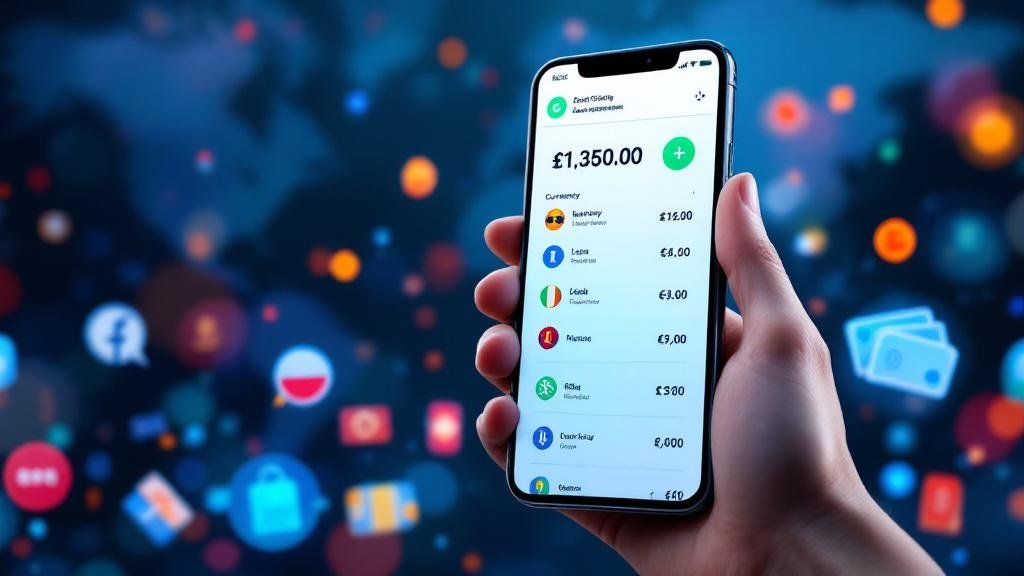Mobile banking has revolutionized the way we manage our finances. No longer do we need to visit a bank or use traditional payment methods to pay bills. With mobile banking apps, you can now pay bills quickly and securely from the comfort of your home, and for international payments, the experience is even more streamlined. One of the critical aspects that make mobile banking truly global is its local currency support. In this guide, we’ll walk you through how mobile banking allows for seamless bill payments, focusing on local currency support in mobile banking and other related features.
What Is Local Currency Support in Mobile Banking?
Local currency support in mobile banking means that mobile banking apps enable users to pay bills in the currency of the country where the bill is issued. This is especially important for people who make payments to international vendors or need to pay for services that are priced in currencies other than their own. By integrating local payment systems in mobile banking apps, banks and fintech companies make it easier for you to make cross-border transactions without needing to worry about currency conversion fees or complex processes.
Why Is Local Currency Support Important?
When you pay bills via mobile banking, there are often associated foreign exchange rates and currency conversion fees if the transaction involves a different currency than your own. Mobile banking apps that support local currencies:
-
Reduce conversion fees: Payments in local currencies avoid extra costs from currency exchange.
-
Provide faster transactions: With real-time currency conversion, your payment can be processed quickly and without errors.
-
Make international transfers simpler: You can send payments to international accounts without manually managing conversion rates.
In essence, mobile banking currency options make cross-border transactions and international payments more seamless and user-friendly.
How Mobile Banking Supports Multiple Currencies
The rise of multi-currency mobile banking apps has simplified the international payments process. Whether you’re paying a bill for a service provider overseas or making an online purchase from a different country, these apps automatically detect the local payment systems in mobile banking that fit the transaction. Here’s how it works:
-
Currency Conversion in Mobile Banking Apps: When paying a bill in a foreign currency, the mobile banking app provides you with an option to see the current exchange rates in mobile banking. This allows you to decide whether to proceed with the payment or adjust the timing based on favorable rates.
-
Mobile Banking Support for Multiple Currencies: Some mobile banking apps can store balances in different currencies, enabling you to easily pay bills in those currencies without needing to convert funds manually.
-
International Currency Support in Mobile Banking: Many apps also offer international currency support, allowing you to easily pay for bills in multiple currencies from a single platform.
Advantages of Using Mobile Banking for Bill Payments
Here are the benefits of paying bills through mobile banking, especially with digital wallet local currency support:
-
Convenience: Pay from anywhere, anytime without the need to visit a physical bank.
-
Security: Mobile banking apps use encryption and security measures to ensure that your payments are safe.
-
Time-saving: The payment process is automated, so you don’t need to manually enter exchange rates or deal with international transactions.
-
Real-time foreign exchange rates: Many apps display real-time foreign exchange rates in banking, helping you understand the cost of your transaction before you make a payment.
-
Seamless currency conversion apps: Apps automatically handle currency conversion for international bills, so you don’t have to do the calculations yourself.
Mobile Payment Solutions with Local Currency Support
The integration of local currency support in mobile payment apps is not just beneficial for local transactions. It’s an essential feature for global transactions too. Apps like PayPal, Google Pay, and even banking-specific apps like those from fintech apps supporting local currencies offer services that allow you to make seamless payments across borders.
Let’s take a look at some of the top mobile payment solutions that support local currencies:
1. PayPal
PayPal supports payments in over 25 currencies. If you’re paying a bill internationally, PayPal will automatically convert your payment into the local currency. They also offer currency exchange services and real-time exchange rates.
2. Revolut
Revolut is known for its multi-currency mobile banking feature. It allows users to hold balances in multiple currencies, and the app offers real-time foreign exchange rates in banking. It’s ideal for those who make frequent cross-border transactions.
3. Google Pay
Google Pay supports local currency payments in many countries, making it a convenient choice for international bill payments. The app integrates with local economies, allowing users to pay bills without worrying about the exchange rate.
4. Wise (formerly TransferWise)
Wise makes cross-border payments easier by offering currency conversion in mobile banking apps with low fees. The app allows users to send money to international accounts in over 50 currencies, with competitive exchange rates.
5. Apple Pay
Apple Pay has expanded to support multi-currency payments. It allows you to use digital wallet local currency support to pay bills or make purchases internationally without needing to worry about exchange rates or conversion fees.
Key Features of Mobile Banking Currency Management
Mobile banking has revolutionized how users manage their finances, and digital banking currency management is one of the primary reasons for its success. Here are a few essential features of mobile banking currency management:
1. Integrated Currency Exchange Services
Many mobile banking apps now offer currency exchange services, which allow users to convert currencies before making international payments. This ensures that you can always pay in the local currency, whether it’s for bills or online purchases.
2. Real-Time Exchange Rates
Access to real-time foreign exchange rates in banking ensures that you can make informed decisions about when to make payments and at what rates. These rates change constantly, and mobile banking apps keep you updated on the most recent exchange rates.
3. Cross-Border Transactions
With mobile banking with international transfers, users can send money across borders, converting currencies as needed. This is especially useful for paying international bills or sending money to family and friends abroad.
4. Integration with Local Payment Systems
Mobile banking apps seamlessly integrate with local payment systems in various countries, making international bill payments quick and hassle-free.
How to Choose the Right Mobile Banking App for Bill Payments
When selecting a mobile banking app for bill payments, there are several things to consider:
-
Currency Support: Ensure that the app supports the currencies you need to pay bills in.
-
Low Fees: Check for apps that offer low or no fees for currency conversion.
-
User-Friendly Interface: The app should be easy to navigate, with a simple payment process.
-
Security: Look for apps that offer encryption and multi-factor authentication to protect your financial information.
FAQs on Paying Bills via Mobile Banking
1. How do I know which currency is being used when I pay an international bill?
Mobile banking apps typically show you the currency being used before you confirm the payment. Apps like Revolut and PayPal also let you know the exchange rate at the time of the transaction.
2. What are the best apps for paying bills in multiple currencies?
Apps like PayPal, Revolut, and Wise are some of the best options for making payments in multiple currencies. They support a wide range of global currencies and offer currency conversion in mobile banking apps.
3. Are there any fees for currency conversion when paying bills via mobile banking?
Most mobile banking apps charge a small fee for currency conversion. However, some apps like Revolut offer fee-free conversions up to a certain limit.
4. How does mobile banking handle cross-border transactions?
Mobile banking apps simplify cross-border transactions by automatically converting currencies based on real-time exchange rates in mobile banking. This eliminates the need for manual conversions and ensures smooth international payments.
5. Can I set up recurring bill payments using mobile banking?
Yes, most mobile banking apps allow you to set up recurring payments for bills like utilities, subscriptions, and loan repayments.
6. Are mobile payments secure for international transactions?
Yes, mobile payments are generally secure, as they use advanced encryption methods and multi-factor authentication to protect your financial information.
7. How do I track my currency conversions in mobile banking?
Mobile banking apps like Revolut and PayPal let you track your currency conversions and past transactions, making it easier to manage your finances.








Comments (0)